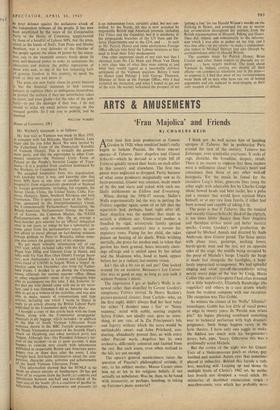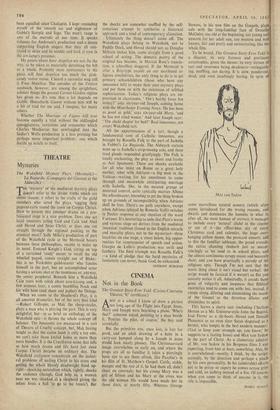- ARTS & AMUSEMENTS
'Frau Majolica' and Friends
By CHARLES REID
A vi Lit their first joint production at Covent IAGarden in 1920, when mankind hadn't really begun to fathom Puccini, the three one-act operas—II Tabarro, Suor Angelica and Gianni Schicchi—which he devised as a triple bill (II Trittico) quickly turned their backs on each other in this country and elsewhere. The first two pieces were neglected or dropped. Partly because of what some producers misguidedly saw as its farce-potential, Gianni was retained, made much of by fits and starts and yoked with such un- likely stablemates as Elektra and Erwartung.
When, during the 1956-57 season, Sadler's Wells experimentally led the way in putting the Trittico together again, some of us felt that the separatists bad, perhaps, been right after all. Suor Angelica was the number that made us scratch a dubious car. Unmarried mother is bundled by rigid, aristocratic family (period early seventeenth century) into a covent for expiatory vows. Pining for her child, she takes poison on hearing of his death. While writhing mortally, she prays for pardon and, in token that pardon has been granted, hears heavenly choir- ings offstage and is smiled upon by her infant and the Madonna who, hand in hand, appear before her in a radiant, last-minute vision.
Isn't this all a bit too pi and pat? One looked around for an antidote. Bernanos's Les Carmd- lites was as good as any, as long as you took it without Poulenc's music.
The impression I got at Sadler's Wells is re-
newed rather than dispelled by Covent Garden's sumptuous Milk.° revival. In Henry Bardon's picture-postcard cloister, Joan Carlyle—who, on the first night, didn't always find her best voice
for either 'I desideri sono i fior' or `Senza mamma,' acted with noble, scaring anguish; Sylvia Fisher, not ideally cast, gave us some- thing, at any rate, of la Zia Principessa's bile and bigotry without which the score would be unthinkably sweet; and John Pritchard, con-
ducting, abundantly proved that, as with every other Puccini work, Angelica has its own orchestra, differently coloured and faceted from the rest. But such assets, even when realised to the hilt, are not enough.
The opera's general mawkishness raises the question of Puccini's philosophical attitude, if any, to his subject matter. Mosco Carrier sums him up as lax in his religious beliefs, if not actually an unbeliever. Was he, then, to be taxed with insincerity, or perhaps, humbug, in taking up Forzano's pious scenario?
I think not. As well accuse him of humbug apropos /I Tabarro. Set in proletarian Paris around the turn of the century, Tabarro has Zolaesque, even syndicalist overtones. It reeks of rags, absinthe, the breadline, despair, revolt. There is no reason to suppose that these matters were a millimetre closer to Puccini's heart and conscience than those of any other well-off bourgeois. Yet the music he found for the stevedore Luigi's bitter, generous lines (sung the other night with admirable fire by Charles Craig) about bowed heads and bent necks, has a pulse and a menace that would have rejoiced Marx himself, or at any rate Jean Jaures, if either had been around and capable of taking it in.
The point is that II Tabarro, like the ironical and rascally Gianni Schicchi, third of the triptych, is ten times better theatre than Suor Angelica and therefore strikes more and better musical sparks. Covent Garden's new production, de- signed by Michael Annals and directed by Ande Anderson, does Gianni proud. The Seine quays, with plane trees, gaslamps, necking lovers, hurdy-gurdy man and the rest, are on opposite sides of the stage, the middle being occupied by the poop of Michele's barge. Usually the barge is made fast alongside the footlights, a hope- lessly impractical arrangement. We had splendid' singing and vivid, eye-off-the-conductor acting nearly every page of the way by Craig, Marie Collier (the sort of Giorgietta 1 had often dreamed of, a little hopelessly), Elizabeth Bainbridge (the ragpicker) and others in a cast drawn wholly from the resident company with one exception. The exception was Tito Gobbi.
As witness the climax of his 'Nulla! Silenzio!' monologue, Gobbi has lost little of vocal power or edge in twenty years. In 'Perche non m'ami his legato phrasing combined something near to technical perfection with high dramatic
poignancy. Such things happen rarely in the lyric theatre. I have only one niggle to make. He fiddled too much with his bargemaster's jersey, belt, pipe, 'baccy. Otherwise this was a profoundly acted Michele.
But the crown of the night was his Gianni Face of a Shakespearean patch or clown, gap toothed and tousled. Astute eyes that sometime, played at imbecility. Behind this façade a ruth• less, mocking will. Leaping up and down the multiple levels of Clerici's 1962 set, he neithe. lost breath nor dropped a vocal stitch. His mimicries of deathbed enunciation struck 2I macabre-comic vein which has probably nevel
been equalled since Chaliapin. I kept reminding myself of the smooth ice and nightmare of Gobbi's Scarpia and Iago. The man's range is one of the marvels of our time. It speaks volumes for Anderson's production and a dozen supporting English singers that they all con- trived to shine and be nimble and look at ease in the arc-lamp's presence.
My points about Suor Angelica are not, by the way, to be taken as materially devaluing the bill as a whole. Probably most newcomers to the piece will find Angelica too much the pink- candy votive statue. I heard a surrealist wag call it Frau Majolica.' The outsides of the Trittico sandwich, however, are among the sprightliest, solidest things the present Covent Garden r6gime has given us. It's true that -a lot depends on Gobbi. Henceforth Gianni without him will be a bit of trial for me and, I imagine, for many others.
Whether The Marriage of Figaro Will ever become equally a trial without the oldfangled appoggiaturas, variations and ornaments which Charles Mackerras has newfangled into the Sadler's Wells production is a less pressing but perhaps more important problem : one which merits an article to itself.































 Previous page
Previous page